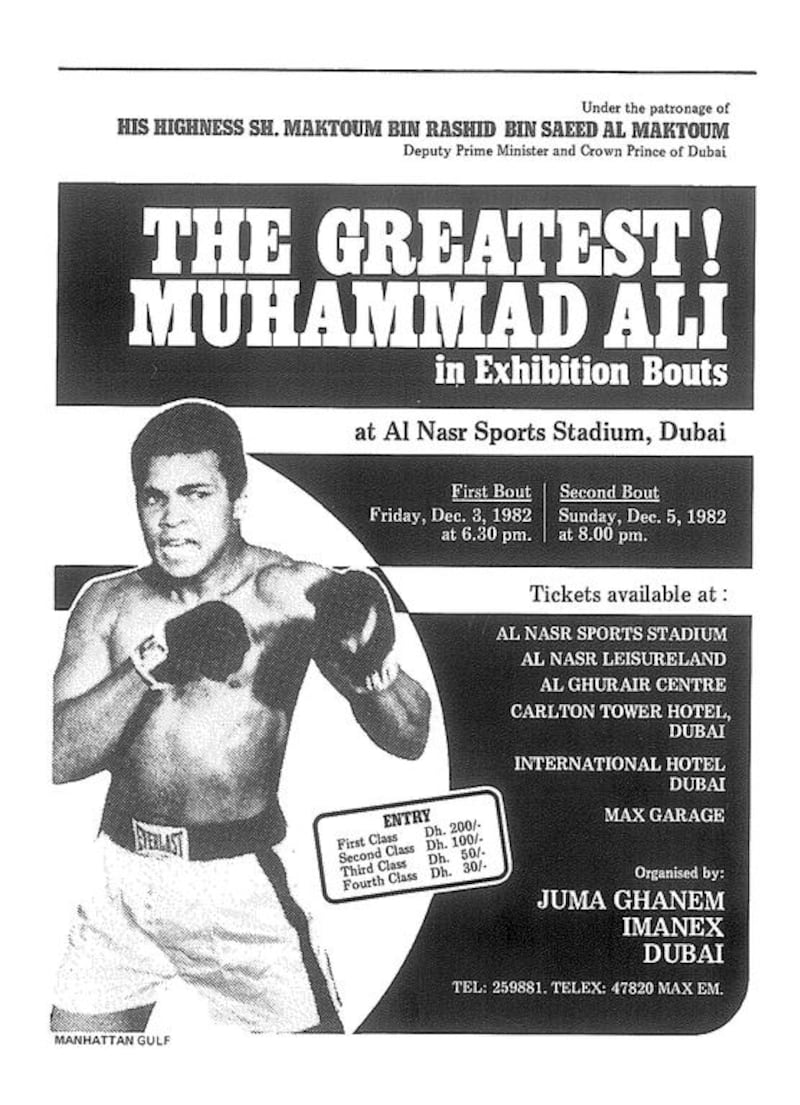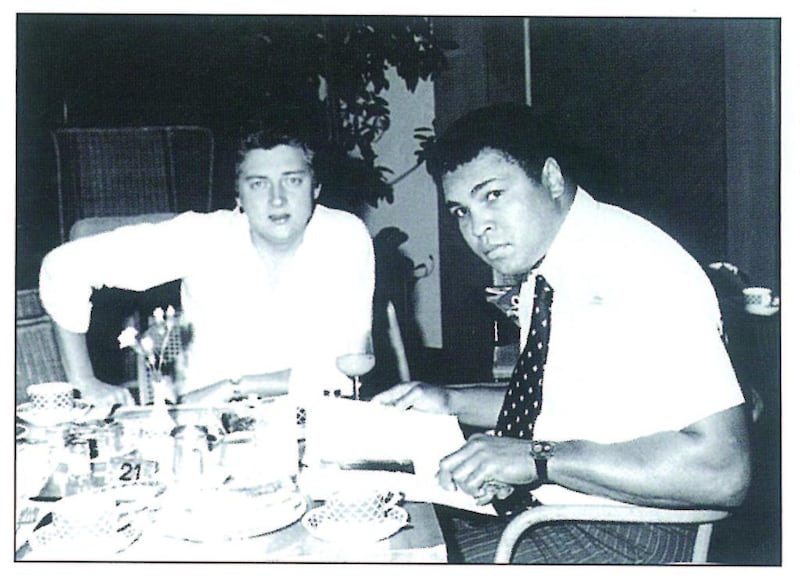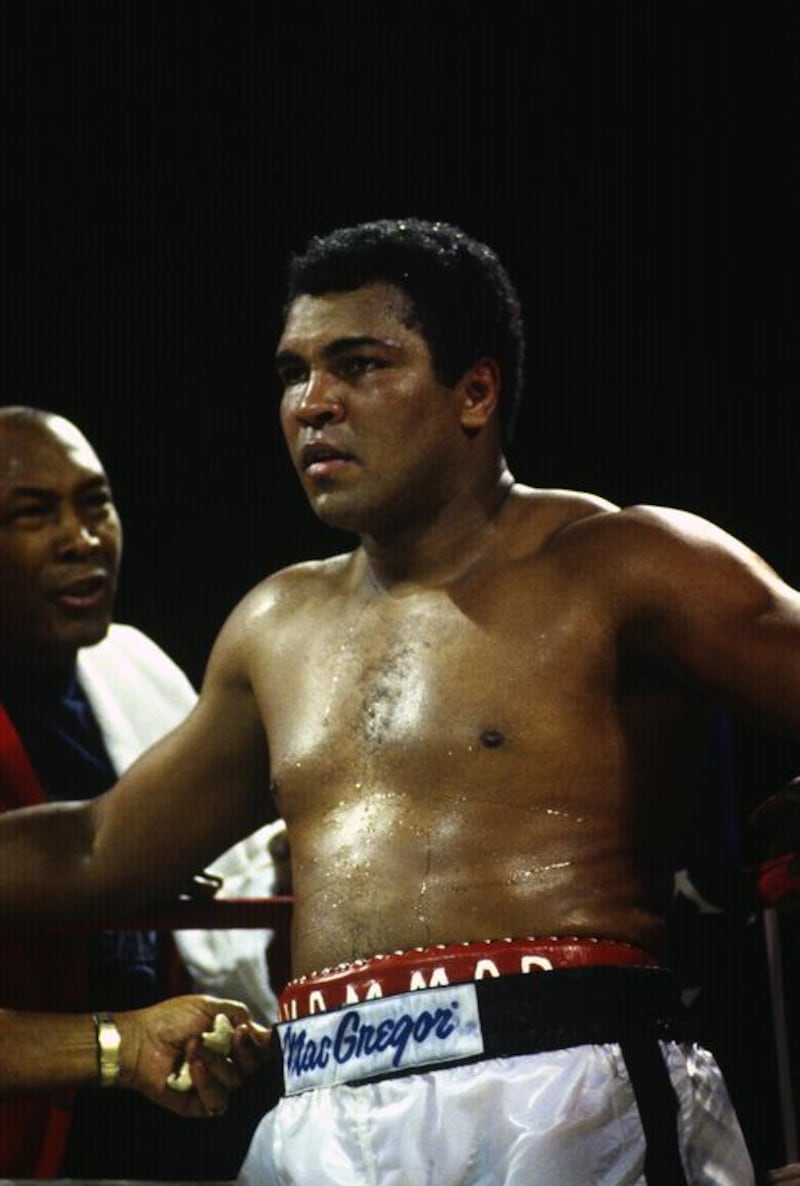ABU DHABI // In November 1975, back when Playboy was a literary publication and Muhammad Ali was heavyweight champion of the world, the most recognisable boxer on Earth granted the popular US magazine an exclusive interview.
“You can go to Japan, China, all the European, African, Arab, and South American countries and, man, they know me,” Ali said. “I can’t name a country where they don’t know me. If another fighter’s goin’ to be that big, he’s goin’ to have to be a Muslim, or else he won’t get to nations like Indonesia, Lebanon, Iran, Saudi Arabia, Pakistan, Syria, Egypt, and Turkey — those are all countries that don’t usually follow boxing.”
Ali never name-checked the United Arab Emirates, but he might as well have. Boxing was not a commonly followed sport in the UAE, but its greatest exponent reportedly visited the then-Trucial States in 1969 and would do so again at least three more times before 1986, including an eight-day trip that involved three exhibition fights.
While countless biographies, documentaries and movies have been written about the life of the man born Cassius Clay, details of his UAE appearances remain largely unchronicled. We know his first visit was during an Islamic pilgrimage to Mecca and we know he stopped by Abu Dhabi and witnessed first-hand his popularity in the city. But we know this only because two rare photographs of this visit were published by The National in 2009.
[ FOR THE ENTIRE MEMORY LANE SERIES CLICK HERE ]
Abdullah Kaddas Al Rumaithi was an agricultural engineer in 1969 and hosted Ali during his stay in Abu Dhabi. In one photo, Ali can be seen surrounded by eager residents as he visits Al Rumaithi’s vegetable farm on Saadiyat Island. The other photo shows the two men sat next to each other: Ali learning how to write his name in Arabic, Al Rumaithi wearing a jacket and proud grin.
Ali Kaddas Al Rumaithi, the late Abdullah’s son, described the heavyweight boxer’s Abu Dhabi sojourn as “a convenient stop” as he headed to Saudi Arabia to begin his Haj.
“He really wanted to see the vegetables growing in the middle of the desert,” Al Rumaithi said. “In those days the population was small, so news of the visit spread quickly. The American expats were excited to have a celebrity visiting them, far away from the US.”
The Kentucky-born boxer’s initial visit to the Emirates was short and sweet, but it evidently left an impression. The clamour to get close to Ali is clear to see in the images, but Mahmoud Mohammed Al Awadhi, an Emirati who grew up in Dubai in the 1960s and 1970s, paints a more vivid picture when remembering the fervour that surrounded Ali fights in those days.
“We would watch all his fights live, probably on Dubai Sports,” Al Awadhi said. “It would be in black and white, but the whole neighbourhood would come to my father’s house and watch with us on the television. We would always take the day off school on days when Ali was fighting.”
In 1978, nine years after his first visit and just days after losing his WBC, WBA and Ring heavyweight titles to Leon Spinks, a 36-year-old Ali had a brief stopover on his way to Bangladesh. Even though he never left Dubai airport, his presence was enough to draw people hoping to catch a glimpse of the self-professed “Greatest”.
[ Floyd Mayweather v Manny Pacquiao and five proposed UAE fights that never happened ]
Saeed Ali, a Sudanese sports journalist who moved to the UAE in 1975, was one of few who managed to sneak inside and speak to Ali. When Ali the journalist asked Ali the boxer for a photo, the “Louisville Lip” gently pressed his fist against the reporter’s face and said: “You look like Joe Frazier — so I’m going to have to beat you!”
Perhaps it was the obvious adoration that convinced events promoter Juma Ghanem to bring the ageing, ailing Ali back four years later for a series of exhibition fights. In 1982, having last fought competitively 12 months earlier — a 10-round defeat to Trevor Berbick in the Bahamas — the three-time world heavyweight champion embarked on a UAE tour that included three exhibition bouts against American Jimmy Ellis and rising West German boxer Reiner Hartmann.
Although rumours had suggested Ali, a month shy of his 41st birthday, was in need of money, the purpose of the exhibition bouts in the Emirates, he told United Press International, was to raise US$2.5 million (Dh9.18m) to help build mosques in the United States. That figure, based on historical currency and inflation rates, equates to $6.25m.
“We are building the first in Chicago. It has already cost us $5m and we need $2.5m more. I will be doing these exhibitions to raise monies to help spread Islam and this is my dream. To help spread the faith in America,” Ali said.
The tour was promoted with posters splashed all over the Dubai Creek road and radio adverts urging listeners to take the chance to see The Greatest “right before your eyes”.
Things, however, did not go entirely to plan.
The first night’s action took place at 8pm on December 1, 1982 at Sheikh Zayed Sports Stadium in Abu Dhabi. Ticket prices ranged from Dh30 to Dh200 and the pre-fight entertainment was provided by, according to one poster, “the hilarious comedian Jagdeep”. Indian Bollywood stars such as Rishi Kapoor and Sarika Thakur were invited, while Ali charmed the media pre-fight with a famous line: “The other night I turned off the light ... and was in bed before the room was dark.”
Yet in quieter moments, Ali, who would be diagnosed with Parkinson’s Disease less than two years later, conceded: “I’m too old ... My boxing reflexes and other actions have all gone. I can’t box in a real fight anymore.”
Ian Fairservice, the editor of What's On magazine, was dismissive of the exhibition tour, calling it "farcical" and "a circus", while Al Ittihad, the Arabic-language sister newspaper of The National, elected not to cover any of Ali's fights here.
At the second event, on December 3, under the stars and in a ring set up on the field at Al Nasr’s Maktoum Stadium in Dubai, Ali’s prowess as a pugilist was visible only intermittently. He fought three rounds each with Hartmann and Ellis, and while both men caught him more than they should have, he landed enough combinations to win both bouts.
Rangi Akbar in Gulf News wrote: "There was no denying the admiration that Ali got from the crowd that was present at the stadium. After the bouts, he walked slowly towards the railings and fans were just content on kissing his hands. Nevertheless, one expected a much bigger attendance judging Ali's worldwide popularity."
Ali expected more fans too and his final night, scheduled two days later at the same venue, was cancelled due to lack of demand. A snippet in the New York Times cited the reason for cancellation as "poor crowd response and sluggish ticket sales in the two previous appearances".
[ Chris Eubank took part in the UAE’s first major bout in 1997 but drew a tepid response ]
Fairservice did not attend the fight, but did secure the country’s only sit-down interview with Ali during his stay in the UAE. Meeting at a coffee shop in Dubai’s International Hotel, close to the airport, Fairservice noted his subject’s “blurred eyes” and a voice that was “barely audible or intelligible”.
The resultant What's On story pulled no punches, calling the UAE tour "a travelling pantomime" and "a tragic vaudeville of lost direction". It also suggested Ali's brain might be damaged and blamed poor ticket sales on people taking "no pleasure in watching an out-of-condition, overweight man ... negate everything that had gone before".
Fairservice waved Ali off towards the airport, where the circus was heading to sold-out shows in Pakistan. He told The National recently that Ali and his entourage had met only with the Sheikh of Ajman and most probably left without a substantial cheque towards the Chicago mosque project.
Four years later, Ali returned, making a promotional appearance for a sponsor. There was no boxing this time, but he still put on a show. During a round-table interview with local media, Ali started doing magic tricks, a common routine in his older years. First, he balanced a silver ball on a handkerchief, then he made the handkerchief disappear.
Tony Lewis, a Welsh reporter then working for Khaleej Times, had watched Ali win the BBC Overseas Sports Personality of the Year award in 1978 and remembered the American reciting a rhyme: "I love your show, I admire your style, but your pay's so bad I won't be back for a while". As a kind of memory test, Lewis relayed the first two lines to Ali, who finished the couplet with a smile. "So he had a memory," said Lewis recently.
Ali has not made a public appearance in the UAE since 1986 and was diagnosed with pneumonia last December, although is said to have fully recovered.
The legend's deteriorating health has not, however, stopped US-based boxing promoter Akbar Muhammad promising to bring Ali to Dubai later this year as part of an HBO fight night that, he claims, will also feature Manny Pacquiao. Dubai Sports Council, however, recently told The National they have nothing on their budget through 2016 for such an event.
Pacquiao, comfortably beaten by Floyd Mayweather Jr earlier this year, has also recently been urged to retire. The more things change, the more they stay the same.
FOLLOW US ON TWITTER @NatSportUAE







